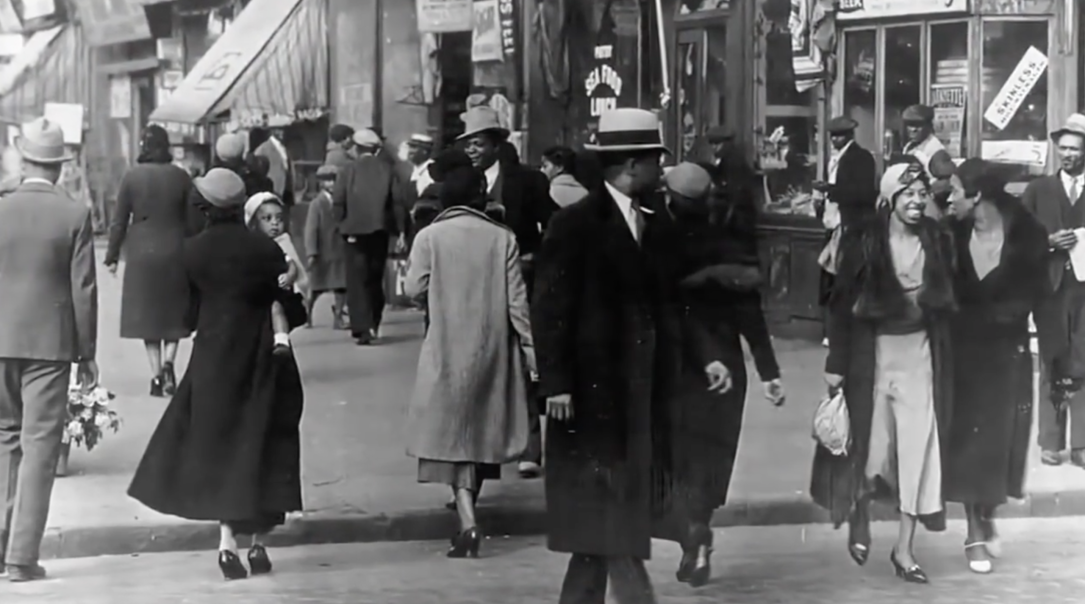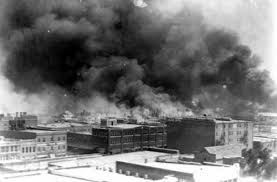What was the single recorded instance in which the U.S. Air Force intentionally dropped bombs on United States citizens?
In 1900, an enterprising Black man, Ottawa Gurley, purchased 40 acres of land on the edge of Tulsa OK. He established a very successful grocery store and began selling or renting property to other Black families. By 1920 this had evolved into a thriving virtually all-Black self-sustaining community of 10,000 people. The town included banks, hotels, clothiers, a hospital, a bus system, 2 movie theaters, 21 restaurants, 30 grocery stores, many schools, etc. It came to be known as Black Wall Street.
The white business owners of Tulsa became increasingly angry and jealous as their Black customers disappeared. Perhaps more importantly, this thriving community was a blatant repudiation of the beliefs fed by faux-science that all Negroes were unintelligent, incompetent, and lacked ambition.
On May 31, 1921, the white people found their occasion for revenge in an event typical for the times: a white woman accused a young Black man of a sexual advance. Whites quickly organized and invaded Greenwood, shooting, burning, terrorizing. The police were called in. They joined the white gangs in the carnage, actually deputizing some of the attackers. The State Militia was called in – and joined with the attackers. The U.S. Air Force was called in – and dropped bombs on the metropolis.
In the end, about 300 Black people lost their lives, 300 businesses were destroyed, and 9,000 people were left homeless. The incident was referred to as a race riot to depict it as a Black uprising that needed to be quelled. Clearly it was a race riot, but perpetrated by white people.
Remarkably, the remaining citizens of Greenwood had largely rebuilt the town within five years of the incident, despite numerous legal obstacles imposed by the Tulsa authorities.
Although Tulsa was the most deadly and costly such incident, many other successful Black enclaves in America experienced a similar vibrancy and met similar resistance and revenge. Approximately 4,400 lynchings of Black people occurred between 1877 and 1950, and according to a recent analysis, many if not most of these were traced to jealously on the part of white business owners.
(Note: I haven’t cited specific sources in order to allow easier reading, but they are available if you wish. A couple are cited below in Resources.)
_________________________________________________________
Now, on to Rochester:
I recently sat with two well-respected Rochester Black business leaders. We were asking more questions than we were answering about the state of Black business in Rochester:
Was there any parallel in Rochester’s history to vibrant, self-sustaining Black business communities like Black Wall Street?
• The closest we could come was the Clarissa Street neighborhood pre-1970. As one of my colleagues noted, the tactics that led to its demise were as intentional as was the bombing of Black Wall Street.
• Today, Jefferson Avenue has a number of successful enterprises, though the Jefferson Avenue Business Association has lost some of its former vibrancy.
• Successful institutions like Freddie’s Mini-Mart and J&E Grocery no longer exist.
• Even in predominantly Black neighborhoods, most of the mini-marts are owned by other-than-African-American minority people.
Is the Rochester Black business community organized?
• There are successful Black businesses, e.g.:
- TruForm Manufacturing
- Henderson Ford
- Eltrex Industries
• Approximately 300 barber shops and beauty salons catering to customers from minority cultures have developed a very active association that supports them.
• Many Day Care centers focus on serving working poor people
• There is a Black-Owned-Business (B.O.B.) Directory, though it is simply a listing, not an active organization
• There is an attempt to establish a Rochester Black Business Coalition, though its formation has stalled.
Why are there so few Black-owned business enterprises in Rochester?
• As some Black citizens become able, a significant number are moving to the suburbs (Black flight), leaving the city neighborhoods without leaders who have the capital to develop local enterprises. Their move to integrate into white society inadvertently leaves their former communities with lost capital and lost leaders.
• There are structural and institutional barriers to borrowing, renting appropriate space, and gaining credibility, which prevent hopeful Black entrepreneurs from pursuing the establishment of a business.
• Some who do attempt to start a business fail because they’re undercapitalized, and the leaders lack the knowledge and skills and mentorship to be successful.
• All these factors, coupled with an implanted message of incompetence or inferiority, discourage an entrepreneurial spirit.
• Finally, to what extent have “jealous white business owners” been responsible for repressing the development of competing businesses owned by minority people?
Another factor is of interest here: The Small Business Council is an affiliate of the Rochester Chamber of Commerce. Of the 25 current Board members, none is African-American. How does this relate to the lack of successful Black entrepreneurs? Is it somehow a metaphor for that lack? What does it suggest? What difference would it make if these leaders were more representative of Rochester’s citizens?
More questions than answers here. The three of us left our meeting with an intent to continue to pursue answers, and to initiate and support solutions.
You might have answers and comments. You can scroll to the bottom of the page to “Leave a Reply”
Resources:
Lynching as a deterrent to Black entrepreneurship:
http://www.latimes.com/opinion/readersreact/la-ol-le-lynching-memorial-business-20180428-story.html
One account of the destruction of “Black Wall Street”: https://www.ebony.com/black-history/destruction-of-black-wall-street
A 15-minute TED talk on some of Rochester’s history re race:
https://www.youtube.com/watch?v=3UQUT4LMhAw&authuser=0
Book: “The Color of Law: A Forgotten History of How Our Government Segregated America” Richard Rothstein
Action:
Identify and support Black-owned businesses. Consider them as a preferential option.
Check out and contribute to KIVA Rochester – crowdfunded loans of $1,000 to 10,000 for entrepreneurs. Supervised by the City of Rochester.
Pay careful attention to candidates’ positions in the upcoming elections. Actively engage in campaigns for candidates who represent minority interests and will advocate for the removal of structural and institutional barriers to business success.
A new Civil Rights Park in Rochester. Follow that link for more into, and attend the opening on September 8, noon to 6:00 at Baden Park on Upper Falls Blvd.
The National Coalition Building Institute will conduct a workshop “How to Tackle Difficult Conversations” – when people have opposing points of view on many topics, e.g., gun control, immigration policy, racism, trade policies, etc.. October 4, 9:00 – 12:00 at Staybridge, 1650 South Ave.. Details to be posted after Labor Day at ncbirochester.org

Thanks, Frank, for this project, for including me and for all that you do in this area. We have so much to learn and this provides a valuable tool towards the process improving.
LikeLike
Thanks, Dan. Mutual admiration!
LikeLike
I remember reading about Black Wall Street and wondered why we never learned about this AND I was hx major. Guess we know who wrote the hxbooks!
LikeLike
Got that right, Gloria. The “winners” write the history books. I do understand that the people of the City of Tulsa, over the years, have acknowledged what a terrible thing this was.
LikeLike
Thanks for this post, Frank. While I was aware of the Tulsa/Greenwood Massacre and Black Wall Street, your post highlights the underlying economic imperialism and resulting injustice of slavery of unchecked white dominated capitalism throughout history up to and including today’s American and world economy. The myth and ideology of “Free Market” capitalism is almost a religion in itself. That it’s intertwined with racism in all its forms around the world is inescapable. Greenwood and its continuing versions in the era of Drumpf is a sad reminder.
LikeLike
Agreed, Bob. That “intertwining” is something we need to come to undo.
LikeLike
Thanks for this blog post, Frank. I’ve read a fair bit about Black Wall Street, yet I learned additional pieces of history here.
With respect to discovering Black businesses in Rochester, people might want to know about:
~Ujaama Marketplace – Held every 1st Saturday at the Baobab Center, 728 University Ave in Rochester. “A.great collection of businesses with Soul food, clothes, books, books on cd, smoothies, ladies jewelry accessories and so much more.” Next Marketplace is scheduled for Saturday, October 6 at 1 PM – 5 PM .
~Calvin Eaton’s marvelous enterprise, aptly named 540 West Main (in Rochester), holds periodic business showcases. Their next event, Small Business and Makers’ Market, is scheduled for Sept. 29, 1-5 pm.
LikeLike
Thanks for calling our attention to these opportunities, Rebecca. I believe you’re aware of many possibilities I might not know about, so please, in the future, let us know this way, or pass them on so I can include them in the “Action” section. Thanks.
LikeLike
Great blog. I liked the 4 parts: history of somewhere else; application to Rochester; Suggested action steps; and references. Very useful and motivational.
LikeLike
Thank you, Frank. Information I would never have known.
LikeLike
Dear Frank,
Please don’t overlook Reenah Golden, a Rochester treasure and gift to our community. Reenah co-founded Kuumba Consultants with Delores Radney as well as the inspiration and founder of The Avenue Blackbox Theatre on Joseph Avenue.
Thanks for your blog. I always learn……
Penny
LikeLike
Glad you mentioned them, Penny. I’m sure there are plenty of others I missed.
LikeLike
My knowledge of Black Wall Street was so superficial… Thanks for the education, Frank.
LikeLike
Thanks for getting the word out about Black Wall St. Something similar happened in several other areas, i.e. Wilmington, NC and Atlanta GA and similarly through urban removal (scandalously called urban renewal) throughout the northeast. More subtly it is done whenever a waste removal plant or garbage dump or prison is located in a neighborhood with mostly low income housing. How can I post Black Wall St articles on Facebook? If you post it I will receive it and share it.
LikeLike
Will do, Deni, thanks.
LikeLike